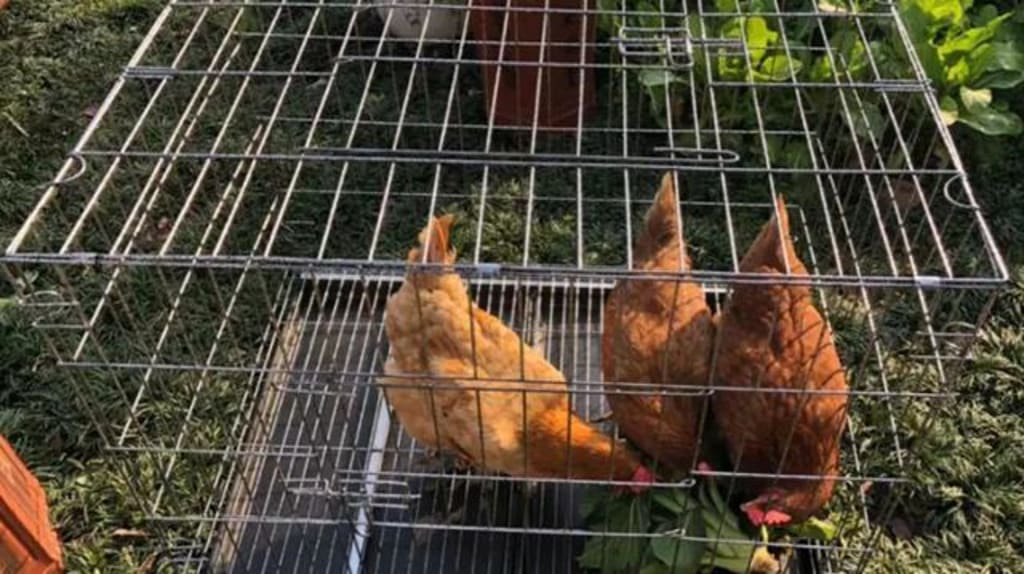When they enter the cage, they lose their freedom, so why do domestic chickens enter the cage at night of their own accord?
Reasons for domestic chickens to enter the cage actively at night

In the past, every household would raise a few chickens to ensure the supply of eggs on the one hand, and kill a chicken to entertain relatives and friends during the New Year's holidays or when they visit. However, different people raise chickens in very different ways, the most common are three: cage, free-range, and coop rearing, of which cage breeding as common, because cage breeding not only prevents chickens from getting lost but also prevents weasels from "stealing chicken".
Of course, the old cage is not like the cage on the farm now as always stay in the cage, they are free during the day, can be in the yard or even on the road, but at night, do not need to herd like sheep, they will be good to go home, when you only need to open the mouth of the iron cage, they will fish in.
So, why do chickens at night will consciously into the cage? This habit has some relationship with their ancestral habits. Let's learn more about it.
Chickens into the cage and ancestral habits related
All domesticated animals are domesticated from the wild, and most of the ancestors of domesticated animals just need to turn "home" into "wild", such as the ancestors of domestic ducks wild ducks (green-headed ducks, and mottled ducks), domestic pigs' ancestors are wild pigs, etc., but domestic chickens The ancestor of the domestic chicken is not the pheasant, because the pheasant is the common name of the pheasant, while the domestic chicken is domesticated from the wild original chicken, the original chicken, and the pheasant are birds of the same family and different genera, the difference is very big.
Pheasant (Pheasant)
From the current archaeological point of view, China was the first to domesticate the original chicken, the domestication time is about 8,000-10,000 years ago, while the earliest animal domesticated by humans is the dog, domestication time is about 15,000 years ago, so the domestic chicken is also one of the earlier domesticated animals.
Although the domestic chicken has been separated from its ancestors for nearly 10,000 years, some habits are still inherited from the original chicken, including the active cage habit derived from the nesting habits of the original chicken.
Wild male and female Prothonotary pheasants
They are mainly found in the Central and South China peninsula, India, Indonesia, and China. In terms of habitat, they prefer to inhabit secondary forests, mixed broad-leaved forests, and bamboo forests at low altitudes (below 1000 meters) in the tropics and subtropics.
Like most birds, the Prothonotary is a polygamous bird, but the Prothonotary is a polygamous bird, with only one adult rooster in a flock and the rest consisting of hens and chicks. Don't come near.
Although they can fly, they are still mainly active on the ground. However, they do not nest like other birds, even during the breeding season, they just dig a small hole in the ground and end up with soft grass inside, and once the breeding season is over, they will not return to the nest.
So, how did their habit of returning to the nest come about? It turns out that the original chicken is a kind of day and night bird, they will fly to the territory at night to rest on the branches of a large fixed tree, this is their nesting habit.
The same is true of domestic chickens, under human domestication, they rarely have the opportunity to go to the trees, and in the cage, wing clipping and artificial screening, the chicken's ability to fly is relatively poor (free-range chickens still have some ability to fly), and long-term cage, so that they treat the cage as their "home" so that the chicken does not need In the evening, they will return to the cage of their own accord.
Of course, this is only one of the factors, the chicken initiative to return to the cage, but also with the following two aspects. Picture
Food-related
Caged chickens are one of the most common methods of raising chickens in rural areas in the past. These chickens are free-range during the day and are free to roam around, in the yard, or on the street, during which time the chickens almost do not need to be fed, as they can get some insects, grass seeds, and other food from the grass outside.
However, by simply letting chickens forage for food on their own, their growth rate is relatively slow, especially for hens, who lay eggs of high quality but with no guarantee of quantity.
Therefore, the previous chicken even free-range will be fed twice, the first is the morning before the cage, the second is the evening after the return to the cage, both of which are carried out in the cage, the cage will have a special chicken food basin, that is to say, the chicken slipped a day, back to the cage can eat enough food, so the chicken is naturally willing to return to the cage.
Environment-related
In the wild, the original chicken flies to the trees at night to rest, the purpose is to avoid natural predators from the ground, after all, the chicken to the night vision ability is almost zero, and the ability to respond to threats is also very poor. And after being domesticated into domestic chickens, although chickens got rid of many natural predators in the wild and became relatively safe, however, they still have two biggest threats: wild cats and weasels (scientific name weasel).
These two animals are day and night, although their main prey is not chickens, once they find a chicken still in the yard at night, they will not let go, and this is precisely the reason why people used to raise chickens are generally free-range during the day and caged at night, and remember that after my family's chickens back to the cage, my mother will be on top of the cage (at the opening) with a board and stones pressed on it.
And a large part of the reason why domestic chickens actively return to the cage at night has a lot to do with avoiding these natural predators, after all, in the iron cage, weasels and wild cats are difficult to hunt down.
Write at the end
Chickens consciously going back to the iron cage at night is not simply a factor that causes this, it has a lot to do with their ancestral habit of fixed habitat, cage food supply habits, and security, so although there is no more freedom in the iron cage, there are more important things than freedom, besides, the long-term breeding behavior also let them know that after dawn, they can go out again to sneak around.






Comments
There are no comments for this story
Be the first to respond and start the conversation.